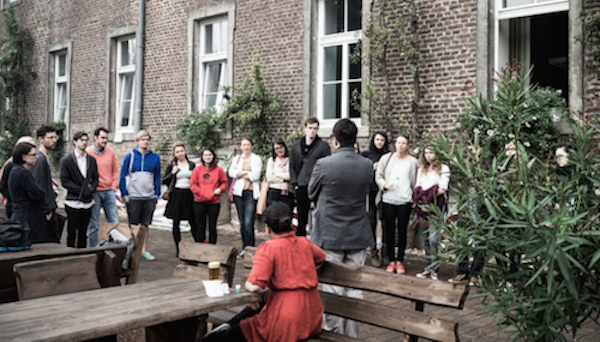In the first of Designmatters‘ three part Sustainable Summer School blog series, Product Design student and head of the ArtCenter EcoCouncil, Arotin Hartounian reflects on his time spent at the 7th annual summer school program in Western Germany.
 At a 17th century monastery situated in a rural area of Western Germany, 28 students gathered for the 7th annual Sustainable Summer School. The summer school program is organized by a collaboration of the Ecosign Academy, Folkwang University of the Arts, and The Wuppertal Institute for Climate, Environment, and Energy. The Designmatters Department at ArtCenter in partnership with the Provost’s office generously sponsored three students to attend this program. Most of the students were from Germany with one student each from Italy, Spain, and Austria. Janya, Daniel and I were the only students from the USA. Over the course of 7 days we lived and studied at the monastery with all the students and teachers. The students were divided into three workshops, each focusing on different ways design can initiate and support sustainable behavior in our daily life.
At a 17th century monastery situated in a rural area of Western Germany, 28 students gathered for the 7th annual Sustainable Summer School. The summer school program is organized by a collaboration of the Ecosign Academy, Folkwang University of the Arts, and The Wuppertal Institute for Climate, Environment, and Energy. The Designmatters Department at ArtCenter in partnership with the Provost’s office generously sponsored three students to attend this program. Most of the students were from Germany with one student each from Italy, Spain, and Austria. Janya, Daniel and I were the only students from the USA. Over the course of 7 days we lived and studied at the monastery with all the students and teachers. The students were divided into three workshops, each focusing on different ways design can initiate and support sustainable behavior in our daily life.
The first two days were focused on the big picture of sustainability with lecturers from experts representing The Wuppertal Institute, The Club of Rome, Google, Commonlands, The Berlin Opera House and The Collaborative Center on Sustainable Consumption and Production. Each expert focused on a different definition of sustainability as well as different approaches and strategies of engaging people. Through these lectures we gained the insights and inspirations needed to develop the projects that our workshop teams would have to present on the last day of the program. One of the major insights I gained through the first phase was that sustainability efforts must address all structures and levels in society. From global economics to governments to businesses. From culture to households to the individual. There was a strong consensus among the experts that the largest obstacle to a truly sustainable future is the current economic model. The current global economic model is incomplete because it does not put any accountable value on ecological services. With nature having an undefined value, consideration for it is trumped by the numerically driven function of the markets, which is to continuously grow. Since global economics has the power to affect governments and cultures, sustainability advocates must be well educated about economics and politics in order to influence a reform in the economic system to one more reflective of the true value of nature.
To effectively change the systems that have projected humanity to modernity is a colossal task. However economics and politics are not separate entities but an aggregate of the collective wills of society. Therefore a paradigm shift is possible if critical mass is formed through intelligent sustainability efforts and possibly a shift in the collective consciousness of humanity. But how can we build towards the critical mass needed to achieve this paradigm shift? This is where the designer is called upon. Designers working in unison with other disciplines have an extraordinary ability to influence behavior and shape culture. Facts, research, and knowledge are not enough to change behavior. Moralization and a call for abstinence also do not work particularly well in changing behavior. The topic of my workshop was Transformational Narration. A powerful narrative could be the tool designers use to break the threshold of sustainable behavior change. Our workshop focused on the narrative structure of the hero’s journey. This narrative structure has proven to captivate humans and resonate with all cultures for millennia. By analyzing the structure of this narrative model we were able to understand what underlying universal human needs are being engaged by the narrative. Using the guidelines of the hero’s journey structure my team and I conceptualized a sustainable publishing house that publishes a series of children’s stories that teach children about topics of sustainability in a way that is easy to understand for children. These stories can help instill a sense of eco-intelligence in the developing mind of the child that will hopefully influence them throughout the rest of their life.












thanks for sharing this very nice article. “Facts, research, and knowledge are not enough to change behavior” i like this line most.